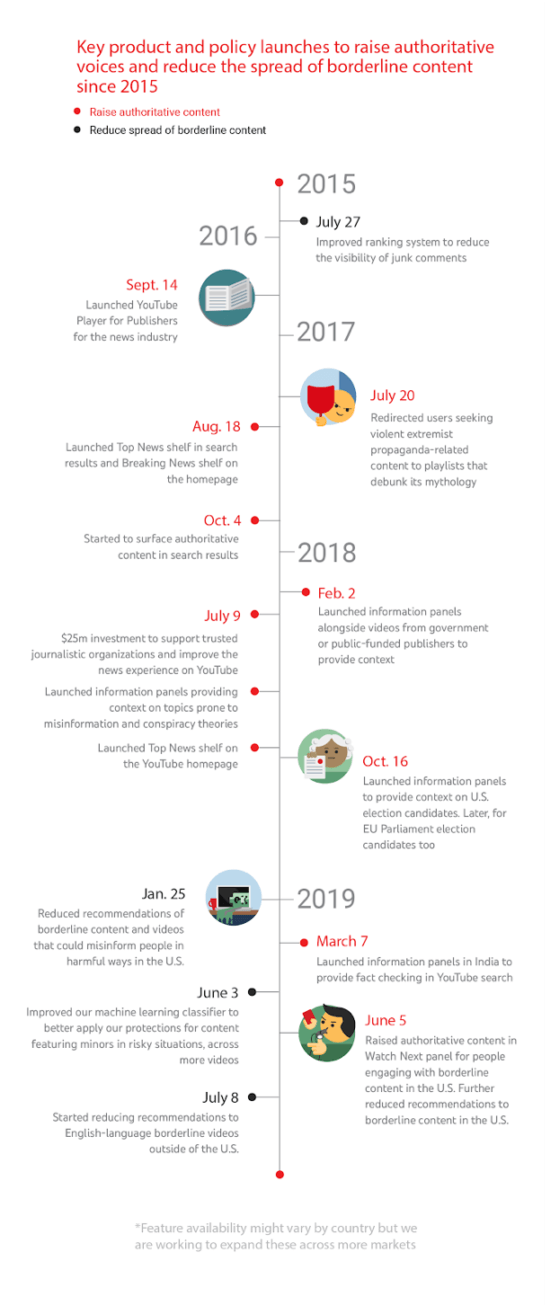Instagram introduces age check, creative professionals more productive 'on-the-go', Facebook suing over malicious ads, YouTube updates on borderline content efforts, Facebook announces new anti-discrimination ad measures
This week has seen Instagram change its policy to bring it in-line with Facebook. The platform will now request the date of birth of those signing up, in a bid to limit younger users from accessing inappropriate content.
New research from Vodafone has revealed that the office is not the place for creative individuals, with many saying they are more productive when working flexibly.
Facebook is making sure that those who break its rules face real-world consequences, starting with a company and two individuals who are accused of creating malicious adverts on the platform.

YouTube has provided an update on its efforts to reduce the spread of misinformation and borderline content, just in time for the 2020 US election campaigns to heat up.
Finally, Facebook has introduced two new measures in its efforts to avoid advertising discrimination, with more measures to be released in the coming year.
Get all the details on each of these stories with our news roundup below.

Instagram adds age check for new users
Instagram has made a big change to its policies in a bid to offer experiences that are age-appropriate. Those signing up to the social media platform will now be asked to provide their date of birth in order to ensure younger audiences are not seeing content that is unsuitable.
This means that content related to things like gambling, alcohol and birth control on Instagram will not be visible to those under a certain age. The decision follows on from criticism faced by the platform from those concerned that Instagram and other social media networks regularly expose children to content that is inappropriate.
In the past, Instagram only required those creating accounts to confirm that they were over the age of 13, which was its blanket policy. While Instagram has now brought in the age check at sign up, it will not be verifying the ages provided. This means it is using the same method as Facebook, but as anyone can put any date of birth in, is this really doing enough to protect children?
Vishal Shah, Instagram’s head of product, said to Reuters: “Understanding how old people are is quite important to the work we’re doing, not only to create age-appropriate experiences but to live up to our longstanding rule to not allow access to young people.”
This is the latest move to improve the experience on the platform, although it is not yet clear what the impact may be.
40% of creatives are more productive and innovative ‘on-the-go’
While an office environment is the traditional workplace for marketers, it may not be the best way to encourage creativity. According to new research from Vodafone, 40% of creative professionals are more productive and innovative while they are out and about.
A survey of 500 creative industry small businesses in the UK found that working ‘on-the-go’ is the best way to encourage creativity rather than having people stuck at their desks. On top of this, 38% of respondents said that they now share the majority of their creative ideas and work digitally rather than in-person.
As a result of these findings, 73% said that technology brings positive change, with smartphones laptops and wi-fi all making it easier for people to work wherever they are. This digital transformation will likely continue to bring more benefits, but businesses needs to assess what this can mean for their working practices.
Anne Sheehan, Enterprise Director of Vodafone UK, said: “It’s hugely encouraging to see that smaller businesses in the creative industries are increasingly competitive, due in part to technology. They rely on tech in many ways – to communicate ideas, to seek inspiration and to enable flexible working. But they tell us they are not IT experts and need help to gain maximum benefit – which is where trusted technology partners can play a role.”

Facebook files lawsuit over malicious ads
Facebook has filed a lawsuit after ads were used on the platform that tricked people into installing malware. The social media giant has filed a suit against ILikeAd Media International Company Ltd and individuals Huang Tao and Chen Xiao Cong after they violated Fakebook’s advertising terms and policies.
According to Facebook, the company and named individuals used deceptive tactics to encourage social media users to click on ads and download harmful malware. This malware then allows the company to access the Facebook accounts of those who had downloaded the malware in a bid to promote diet pills and counterfeit goods.
Tactics used to encourage people to click on the ads included the use of celebrity images. The company also used ‘cloaking’ in that it shows one version of the landing page the ad would go to to Facebook but took the user to a different page.
In a post explaining the lawsuit, Facebook said: “Cloaking schemes are often sophisticated and well organized, making the individuals and organizations behind them difficult to identify and hold accountable. As a result, there have not been many legal actions of this kind. In this case, we have refunded victims whose accounts were used to run unauthorized ads and helped them secure their accounts.”
It continued to say that the platform is working to keep detecting malicious behaviour directed toward Facebook in a bid to protect the platform and its users. The social media giant will also be creating real-world consequences for those who are found to be deceiving users and violating terms and policies.

YouTube provides update on misinformation efforts
The fight against fake news is ongoing across social media platforms, especially as the US gets ready for another presidential election. YouTube is taking this incredibly seriously, especially as the platform is now a primary source for a lot of news and information. As such, YouTube has outlined its ongoing efforts to reduce misinformation on its platform.
In its most recent update, YouTube said: “Over the past couple of years, we’ve been working to raise authoritative voices on YouTube and reduce the spread of borderline content and harmful misinformation. And we are already seeing great progress. Authoritative news is thriving on our site. And since January 2019, we’ve launched over 30 different changes to reduce recommendations of borderline content and harmful misinformation. The result is a 70% average drop in watch time of this content coming from non-subscribed recommendations in the US.”
YouTube has mapped out the updates it has made over the last few years in a bid to stop misinformation, showing that five updates were made in 2019 alone. These including reducing how often borderline content and videos was recommended, the launch of fact checking in YouTube search in India, Improved machine learning, raised authoritative content in the Watch Next panel for people watching borderline content an started reducing recommendations to English-language borderline videos outside of the US.
The platform is also working to prioritize “authoritative voices” in results when people are searching for news and information and in the Watch Next panel. An example of this highlighted by YouTube is the search for “Brexit” on the platform. Although results will vary, around 93% of the global top 10 videos come from channels that have high authority on the subject.
YouTube is also doing more work on borderline videos, which are those that include content that comes close to violating Community Guidelines but doesn’t quite cross the line. While these videos make up a small amount of the videos on the platform, it is still looking at ways to reduce their negative impact.
Download our Individual Member Resource – Managing social media plan example template
This template is designed to be a practical model you can quickly apply to your business or your clients' business.
Access the Managing social media plan example template
Facebook announces new anti-discrimination ad measures
Facebook has announced two new measures that will be used to enforce its recent additions to rules around discriminatory audience targeting. Announcing the measures in a blog, Facebook also said that they will provide more transparency into the platform’s ad processes.
Facebook’s advertising policies have always aimed to avoid discrimination and after a settlement earlier this year with a number of civil rights organizations, the platform introduced a new process for how ads can be bought in the US by those offering housing, employment or credit opportunities.
The enforcement of this process is now being expanded across all the tools that are used by businesses to buy ads on the platform. A housing ad section is also being added to the Ad Library, making it easy to search for and view ads in the US that show housing opportunities – whether you are the intended audience for the ads or not.
Over the next year, Facebook will also include adverts that offer employment or credit opportunities to the Ad Library.











